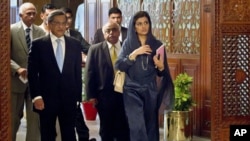ISLAMABAD —
The foreign ministers of India and Pakistan met in Islamabad Saturday to review progress the two rival nations have made in their recently resumed wide-ranging peace dialogue. The extensive discussions also witnessed the signing of a much-awaited new visa agreement to ease tough cross-border travel restrictions.
Speaking to reporters at the end of their extensive talks, Pakistani Foreign Minister Hina Rabbani Khar and her Indian counterpart, S.M. Krishna, told reporters the newly-signed visa agreement is an important step forward in improving relations.
Foreign Minister Khar said the pact will enhance trade, business, cultural and political exchanges between India and Pakistan. She stressed that both countries have made significant progress in the past year toward improving relations and reiterated her country is committed to building on the momentum.
"We will move forward. What has happened until now is history and we will not be held hostage to history," she said.
Indian Foreign Minister Krishna equally reciprocated his Pakistani counterpart’s optimism, saying his country is determined to moving forward to write a new chapter of peace and cooperation in the bilateral relationship. But he admitted that with just few meetings and given the complexities of bilateral relations, India and Pakistan cannot solve their long-running Kashmir and other territorial disputes.
"India has always believed that a step-by-step approach is what will take this relationship forward," he said.
Pakistan and India have fought three wars since 1947, two of them over the divided Kashmir region. But relations particularly with respect to trade have improved in the last two years.
Pakistani President Asif Ali Zardari traveled to India in April where he invited Prime Minister Manmohan Singh to visit Pakistan later this year.
At Saturday’s news conference in Islamabad, Foreign Minister Krishna, without giving a firm commitment, said that the Indian prime minister could visit Pakistan. "I think, the visit will take place at an appropriate time when the atmosphere is ripe, when he feels that something worthwhile will come out of his visit to Pakistan," he said.
India accuses Pakistan-based militants of planning the November 2008 Mumbai terror attacks that killed 166 people. Pakistan has detained and put on trial several suspects but faces criticism from New Delhi for a lack of progress in bringing the culprits to justice. Pakistani authorities cite insufficient evidence as a major hurdle in taking the judicial process to its logical end.
Speaking to reporters at the end of their extensive talks, Pakistani Foreign Minister Hina Rabbani Khar and her Indian counterpart, S.M. Krishna, told reporters the newly-signed visa agreement is an important step forward in improving relations.
Foreign Minister Khar said the pact will enhance trade, business, cultural and political exchanges between India and Pakistan. She stressed that both countries have made significant progress in the past year toward improving relations and reiterated her country is committed to building on the momentum.
"We will move forward. What has happened until now is history and we will not be held hostage to history," she said.
Indian Foreign Minister Krishna equally reciprocated his Pakistani counterpart’s optimism, saying his country is determined to moving forward to write a new chapter of peace and cooperation in the bilateral relationship. But he admitted that with just few meetings and given the complexities of bilateral relations, India and Pakistan cannot solve their long-running Kashmir and other territorial disputes.
"India has always believed that a step-by-step approach is what will take this relationship forward," he said.
Pakistan and India have fought three wars since 1947, two of them over the divided Kashmir region. But relations particularly with respect to trade have improved in the last two years.
Pakistani President Asif Ali Zardari traveled to India in April where he invited Prime Minister Manmohan Singh to visit Pakistan later this year.
At Saturday’s news conference in Islamabad, Foreign Minister Krishna, without giving a firm commitment, said that the Indian prime minister could visit Pakistan. "I think, the visit will take place at an appropriate time when the atmosphere is ripe, when he feels that something worthwhile will come out of his visit to Pakistan," he said.
India accuses Pakistan-based militants of planning the November 2008 Mumbai terror attacks that killed 166 people. Pakistan has detained and put on trial several suspects but faces criticism from New Delhi for a lack of progress in bringing the culprits to justice. Pakistani authorities cite insufficient evidence as a major hurdle in taking the judicial process to its logical end.




